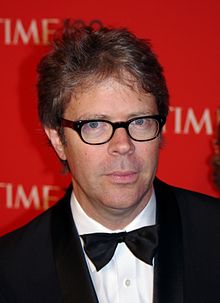
An Open Letter to Jonathan Franzen

Jonathan Franzen at the 2011 Time 100 gala / by David Shankbone
Hi, Jonathan,
I read your essay in the Guardian, and, I have to say, I’m worried about your professional legacy. I agree with some of what you had to say, disagree with you on other points, but what I really wish is that you had someone in your life to pull you aside and talk to you about the accessibility of your nonfiction. I suppose I have to be that person.
I’m a fan of your novels and your nonfiction. I remember reading your work in How to Be Alone and The Discomfort Zone and your criticism in various publications; they all gave me that pleasurable readerly brain zap. I could see myself in your descriptions of being a smarty-pants kid who wouldn’t let anyone else win. I loved that we both felt passionate about strange things (the Peanuts comic strip and bird watching for you, eighties pop songs and The Lost Colony for me). I loved that you were engaged with literature even when I remained unconvinced of your arguments.
But then I read more than 5,000 of your words in this style:
And meanwhile the overheating of the atmosphere, meanwhile the calamitous overuse of antibiotics by agribusiness, meanwhile the widespread tinkering with cell nucleii, which may well prove to be as disastrous as tinkering with atomic nucleii. And, yes, the thermonuclear warheads are still in their silos and subs.
Jesus, Jonathan. That’s some pretentious prose.
Which is not to say that I don’t recognize myself here. I do. The ugliest part of myself that comes out when I’m arguing with people about, say, gun control or corporate subsidies: I start to use a vocabulary that I know very well my opponents don’t share. I make them feel stupid.
An armchair psychologist wouldn’t even break a sweat diagnosing what’s going on with you. You write wildly popular novels, ones in which the emotional core centers around things like family and marriage. But the readers who count most to you are “serious” ones—ones who have the intellectual power (or sheer stamina) to chew through “What’s Wrong with the Modern World.” You’re turning to this dense prose because you don’t want history to mark you down as merely a great novelist. You also want to be remembered as a great intellectual. (There’s a gendered aspect to this, too, but I fear it will fall on deaf ears.)
This is what I want to tell you, Jonathan: You’re trying too hard, honey. People know you’re smart.
Like you, I’m a privileged person: white, college educated, straight, living in the United States. But unlike you, I’m a woman (inching steadily closer in age to the German hausfraus you disdain than the pretty girl you didn’t bed). More to the point, though, I didn’t grow up with a financial safety net. I put myself through college. I come from a long line of coal miners. When I write, I want them—and people like them—to have access to my prose.
You write with concern for the warehouse workers at Amazon, but your big ideas will never reach them. Who the hell wants to spend their day off trying to glean the basic concepts wrapped tightly inside the kind of language you’re using? Who wants to spend their free time feeling stupid? If you’re truly trying to disseminate your ideas to the masses, it’s your job to take difficult—or abstract, or academic—concepts and render them in prose that’s actually an engaging read. I want my pleasurable brain zaps back.
There is, I guess, the possibility that you’re not actually trying to reach the masses, at least with your nonfiction. There’s the possibility that you’re trying to establish yourself in the canon of writers whose work is notoriously difficult, although intellectually groundbreaking. There’s the possibility that trying to keep up in some macho literary pissing match is fueling this new spate of inaccessible work.
Oh, Jonathan, I hope not.
With conditional love,
Jennifer
——
About the author: Jennifer Niesslein is a writer and editor living in Charlottesville, VA, and a regular online contributor to VQR. She founded and edits Full Grown People. You can visit her website at www.jenniferniesslein.com.
